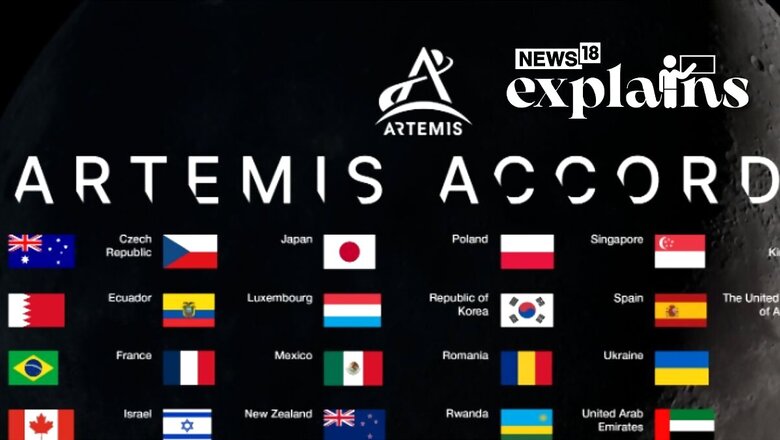
views
India has decided to join the Artemis Accords, which brings like-minded countries together on civil space exploration, and NASA and ISRO have agreed to a joint mission to the International Space Station in 2024, the White House said Thursday.
On space, we will be able to announce that India is signing the Artemis Accords, which advance a common vision for space exploration for the benefit of all humankind, a senior administration official told PTI hours before the meeting between Prime Minister Narendra Modi and President Joe Biden in the Oval Office.
What are the Artemis Accords?
The Artemis Accords, rooted in the Outer Space Treaty of 1967 (OST), represent a collection of guiding principles intended to shape and govern the exploration and utilization of outer space in the modern era, as per NASA.
While non-binding in nature, these accords are spearheaded by the United States and aim to facilitate the return of humans to the moon by 2025 under the Artemis program.
Moreover, they envision a broader objective of extending human presence and exploration to destinations such as Mars and beyond. The Artemis Accords serve as a framework to ensure peaceful and collaborative civil space exploration endeavors in the 21st century.
As of May 2023, the number of signatories to the Artemis Accords stands at 25, representing a diverse range of countries. These signatories include the United States, the United Kingdom, Japan, Italy, Canada, Brazil, Australia, Bahrain, Colombia, the Czech Republic, France, Israel, Luxembourg, Mexico, New Zealand, Spain, Nigeria, Poland, the Republic of Korea, Romania, Rwanda, Saudi Arabia, Singapore, Ukraine, and the United Arab Emirates (UAE).
What are the Principles of the Artemis Accords?
The Artemis Accords outline several key principles that govern space exploration and cooperation among signatory nations, according to NASA.
Peaceful purposes: All participating countries commit to conducting space activities exclusively for peaceful purposes, adhering to relevant international laws.
Transparency: Signatories are expected to be transparent about their national space policies and exploration plans. They should also share scientific information with the public and the international scientific community in good faith.
Interoperability: The development of common exploration infrastructure and standards is emphasized, enhancing cooperation, scientific discovery, and commercial utilization. This includes areas such as fuel storage, landing structures, communications systems, and power systems.
Emergency assistance: Countries agree to provide assistance to astronauts and personnel in distress in outer space.
Registration of Space Objects: The Accords recognize the importance of registering relevant space objects according to the Registration Convention, allowing for better coordination and information sharing.
Preserving Heritage: Nations are encouraged to preserve historically significant landing sites, artifacts, spacecraft, and evidence of human or robotic activity on celestial bodies, following mutually agreed standards and practices.
Space Resources: The Accords affirm the extraction and utilization of space resources, such as those from the Moon, Mars, comets, or asteroids, in accordance with the Outer Space Treaty. Ownership claims over extracted objects are not allowed.
Deconfliction of Activities: Countries conducting Moon exploration are urged to establish safety zones to prevent harmful interference with the activities of other nations.
Orbital Debris: Signatories commit to the safe and timely disposal of spacecraft at the end of their missions, as well as reducing the generation of long-lived or harmful debris.
ISRO & NASA to Collaborate
The aforementioned official also told PTI said that NASA and the ISRO are developing a strategic framework for human spaceflight cooperation this year.
In addition, NASA and ISRO have agreed to a joint mission to the International Space Station in the year 2024, said the official.
PTI contributed to this report



















Comments
0 comment